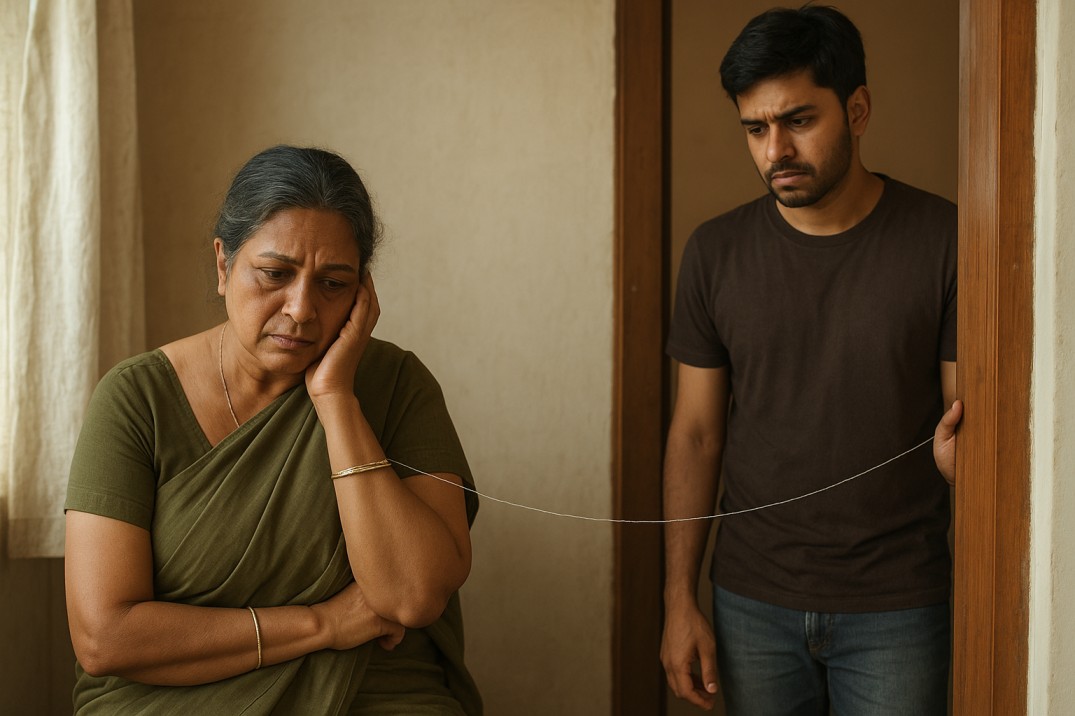“You’re alive because of us. We sacrificed everything for you“
These words sound like love. But what if they are emotional anchors, not wings?
When Care Becomes Control: Unpacking Emotionally Enmeshed Parenting
In many Indian homes, parenting doesn’t always end when the child grows up. It simply shifts forms into silent guilt, subtle control, and disguised emotional threats.
Unhealthy parenting can look like constant check-ins, discouraging independent choices, or subtle disapproval that lingers like a shadow.
A 28-year-old from Chennai shared, “My father sends me motivational job quotes every morning but our conversation often ends with ‘Hope you make it this time at least.’ ‘All are getting jobs who are less talented than you, why are you not getting anything?’ ‘don’t disappoint us again’. To be honest, it feels less like encouragement and more like pressure.”
A 34-year-old banker, said he hides his travel plans from his parents to avoid long emotional monologues about importance of saving money, safety, values and (let’s not forget the final straw) “what will people say?”
These aren’t isolated stories. They are the echoes of generational trauma where emotional boundaries were never allowed to grow. From guilt-laced care to subtle disapproval, these early patterns shape who we marry, how we communicate, and how we see ourselves.
Long-Term Impact: How Unhealthy Parental Patterns Stay Within Us
Children raised in such environments often grow into adults who:
- Say yes when they mean no
- Overthink every decision, fearing judgement
- Internalise remarks
- Struggle with asserting boundaries, even in adult friendships and marriages
- Carry guilt for wanting space or independence
- See self-worth through external validation
- Even worse, they believe this was “normal.” That love must come with conditions.
When the Son Becomes the Silent Sacrifice
For many Indian men, especially sons raised by emotionally enmeshed mothers, the script is deeply tangled. These men often appear confident, even aggressive in public spaces but soften, become unsure, or submissive in front of their mothers. Not out of obedience, but out of emotional vulnerability. They are not afraid of a scolding they fear the silence, the sulking, the “I’m hurt, you didn’t tell me/ after all we did, this is what you give us” drama.
This fear isn’t weakness. It’s emotional conditioning.
In therapy, many men share that they feel guilt for saying no to their mother, as if they are betraying her love. They fear emotional disappointment cloaked in concern. As a result:
- They become hyper-competitive outside, constantly measuring success to earn approval and earn respect.
- They either overreact or go emotionally numb when criticized.
- They struggle in marriage, where their spouse expects them to show leadership and emotional depth not childhood conditioning.
- They fear emotional intimacy with their wife, believing any softness will invite control, not connection.
A client once said, “When my wife questions a decision, I feel she’s trying to overpower me just like my mom did, only in a different tone.” That’s how deep these patterns run.
When the Daughter Becomes the Silent Peacekeeper or the Outspoken Rebel
For many women raised in emotionally enmeshed homes, survival meant keeping everyone happy. They learnt early to absorb hurt without showing it, to over-please, and to keep peace at the cost of their own needs. As adults, they may struggle to say no, fear being called ungrateful, or find themselves drawn to relationships where they keep giving without receiving.
Others take the opposite route and grow into outspoken rebels. They push back hard against anything that feels like control, sometimes mistaking constant resistance for freedom. They may test boundaries with partners, friends, or at work, determined never to be “told what to do” again. But whether quiet compliance or loud defiance, both are shaped by the same early message, your worth depends on how well you follow the unspoken rules.
And just like men, these early roles often show up again in adult relationships, shaping how daughters connect, trust, and handle conflict with their partners.
Romantic Relationships: The Mirror That Exposes the Script
When these emotionally wired adults enter romantic partnerships, they often unknowingly recreate their childhood dynamics.
They may choose partners who:
- Are dismissive, controlling, or emotionally demanding because it feels “familiar”
- Question them or keeps a tab on them just like their parents did
- Evoke old fears of abandonment or rejection
Displaced anger becomes common. A wife expresses a concern, and suddenly the husband lashes out not because of her words, but because she unknowingly touched a raw nerve from childhood. Or the partner withdraws emotionally, fearing that sharing too much will make them vulnerable to control again.
Untangling the Toxic Strings Without Guilt or Shame
Healing doesn’t mean hating. It means understanding.
Here is how to start:
- Acknowledge the pattern without labelling your parents as villains.
- Validate your feelings. You can love someone and still be hurt by them.
- Build new boundaries. They don’t have to be drastic, they just have to be consistent.
- Re-parent yourself. Offer the safety and freedom you once needed.
- Talk to a professional. Emotional detangling needs clarity, not confusion.
At Dee-Cognito, we guide individuals to understand their emotional blueprints, break free from inherited guilt, and create healthier connections with themselves and others. Reach out to Dee-Cognito

